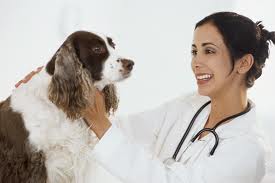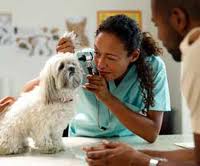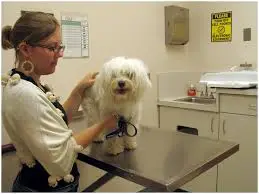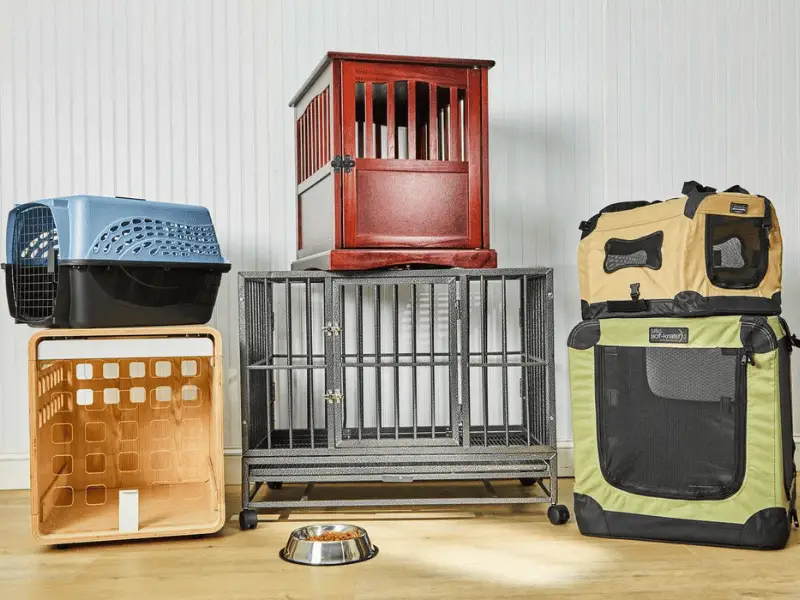Time for that Annual Vet Exam?
 A vet exam is probably not one of your dog’s favorite activities, but the beginning of the year is a great time to make sure you’ve got all of your ducks in a row for the new year, which includes all those doctor (your you) and vet (your dog) check ups. It’s a good thing to do as it ensures your dog is healthy and you can likely catch any health issues earlier, especially as they age more quickly than humans.
A vet exam is probably not one of your dog’s favorite activities, but the beginning of the year is a great time to make sure you’ve got all of your ducks in a row for the new year, which includes all those doctor (your you) and vet (your dog) check ups. It’s a good thing to do as it ensures your dog is healthy and you can likely catch any health issues earlier, especially as they age more quickly than humans.
When you book the appointment with your veterinarian, ask whether you need to fast your dog before the visit, as well, as if you need to bring in fresh urine or fecal samples from your dog.
Check list of items to bring to the Vet Exam
- Your dog’s leash and collar
- Your dog bag or kennel if required or if it makes your pet more comfortable
- Your dog’s muzzle if needed (i.e. they bite)
- A recent stool sample (vet needs to test it for parasites)
- Your dog’s favorite treats – my dog won’t eat the treats at the vet so it’s better to bring the ones you know your dog loves
- Your pet insurance info (note that most pet insurances don’t pay for wellness visits, but insurance might cover other tests/treatments your dog needs
- Your dog’s health history (especially if you are switching vets)
- A list of questions you might have. Do NOT be shy to ask anything about your dog.
 When you’re at the vet exam, the vet will ask you a set of routine questions about your dog’s lifestyle. You might want to think about these in advance or write them down. The vet is likely to ask about your dog’s exercise, diet (make sure to know the brand(s) of dog food), thirst, behavior, habits, bowel movements, urination, parasite prevention (e.g. Frontline, Heartgard) and general health.
When you’re at the vet exam, the vet will ask you a set of routine questions about your dog’s lifestyle. You might want to think about these in advance or write them down. The vet is likely to ask about your dog’s exercise, diet (make sure to know the brand(s) of dog food), thirst, behavior, habits, bowel movements, urination, parasite prevention (e.g. Frontline, Heartgard) and general health.
At the Annual Vet Exam
As mentioned before, at the vet exam, the vet or vet technician will ask you a set of routine questions about your dog. If you live in an area where Lyme disease is prevalent or you take your dog in areas where they might be at risk for Lyme disease, definitely tell your vet so they can check your dog for any possible symptoms.
 Next the vet or the vet technician will weigh your dog. If your dog is really squirmy on the scale, you should probably know approximately how much your dog weighs before you go to the vet just in case there is a major discrepancy. This has happened with Kobi before and we often need to weigh him a couple times on one scale or on two scales to make sure we got the right weight reading.
Next the vet or the vet technician will weigh your dog. If your dog is really squirmy on the scale, you should probably know approximately how much your dog weighs before you go to the vet just in case there is a major discrepancy. This has happened with Kobi before and we often need to weigh him a couple times on one scale or on two scales to make sure we got the right weight reading.
The vet will do a physical evaluation of the dog. This will including examining your dog’s eyes, ears, nose, teeth, mouth, haircoat, skin, heart, lungs, pulse, lymph nodes, legs, toenails, abdomen and general body condition.
The vet should also do a wellness blood screen during the annual vet exam.
Your dog’s vaccines should also be updated at this time. Typical vaccines would be:
- Bordatella/Para-Influenza (aka Kennel Cough) – Many doggie daycares require this vaccine once every 6 months.
- Leptospira
- Distemper/Parvo
- Rabies at least once every three years. Every state in the U.S. has a 3-year rabies law, however, depending on what city or municipality you live in, the laws may be more restrictive, requiring every-year or every two-year rabies vaccines.
After the Vet Exam
A lot of dogs hate to go to the vet, so it might be helpful to plan some extra play time or a long walk after the vet exam.
If your dog is really nervous or stressed out when it goes to the vet, some vets encourage bringing your dog to the vet just to visit (not for an appointment) and perhaps get a treat, so your dog becomes more accustomed to visiting the vet and does not always have poking, needles and other uncomfortable procedures associated with the vet office. This might reduce your dog‘s stress when it needs to go to the vet for an actual appointment.


